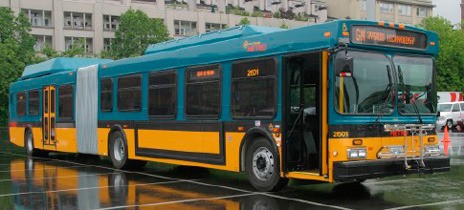King County Executive Dow Constantine sent a proposal Monday to the Metropolitan County Council to charge a $20 per year vehicle license fee for two years to help fund Metro buses because of declining sales tax revenue.
Constantine said Metro could face cutting 17 percent of bus service over the next two years without the new fee, according to a King County executive media release.
The Legislature recently authorized the county to charge a vehicle license fee. Any fee of $20 or less approved by the Council would not have to go to voters for approval if a supermajority of at least six of the nine Council members are in favor of the proposed ordinance. The Council also could vote with a simple majority of five members in favor to send the measure to voters for approval.
The earliest date on which the County Council can act on the legislation is July 22, or 90 days after the congestion reduction bill was approved by the Legislature. Voters could see the measure on the November ballot.
“To keep people moving and economic recovery on track, this temporary funding will preserve bus service near current levels while we work out a statewide transportation solution that supports transit,” said Constantine in the media release. “I don’t hear anyone asking for less bus service, but the system reduction that would be required if there is no interim funding would impact four of every five of our riders. It would directly or indirectly affect every community in the county, at a time when demand is going up.”
Should the fee not be enacted, the executive also transmitted legislation for the Council to shrink Metro service by 600,000 hours of annual bus service over the next two years, or 17 percent of the entire system – the rough equivalent of eliminating all rush hour bus service for commuters, or all weekend service in King County. The ordinance covers just the first round of service cuts – a 100,000-hour reduction to begin next February.
“The Council has a stark choice before us — enact emergency funding for Metro or watch our transit system shrink down to 1996 service levels,” said County Councilmember Larry Phillips, chair of the Council’s Transportation, Economy and Environment Committee. “With the fragility of King County’s economic recovery, the burden of $4 per gallon gas and the crisis of climate change, preserving our transit system is the most important action we can take for mobility, jobs, and the environment in King County. I support Council action on this emergency, stopgap funding measure so we can begin talking to voters and Olympia about permanent stable funding to save Metro.”
The State Legislature recently granted King County authority for the Congestion Reduction Charge after hearing testimony on sweeping reforms at Metro – including staff reductions, operational efficiencies, labor partnerships, fare increases, the cancellation of bus replacements and the tapping of cash reserves – that have generated nearly $400 million in savings over the past several years.
“I hope the County Council will see transit as we did, a critical service that has to be maintained,” said State Rep. Deb Eddy of Kirkland, who serves on the House Transportation Committee. “The Legislature was quite reluctant to take any action that looked like increasing the burden on working families, but giving King County this limited authority ensures that those families can get to work and school. King County has stepped up and begun to truly redesign Metro service to wring every bit of value from existing funds, but the value of those major reforms – which many of us have been working on for years – could be lost or much diminished if service is cut to the extent projected.”
The savings and efficiencies created by Metro over the past few years save approximately $143 million per year, but the drop in sales tax revenues means Metro still faces an operating shortfall of $60 million a year each year from 2012 through 2015.
The two-year charge would generate about $25 million per year. The combination of the congestion charge and the use of one-time reserves would enable Metro to avoid large service reductions in 2012-2013.
The prospect of service reductions comes even as riders are increasingly counting upon affordable alternatives to major construction on State Route 520 and the Alaskan Way Viaduct. A strong Metro transit system is also critical in supporting job creation and economic recovery by offering riders commuting choices that, in turn, keep congestion in check.
“Transit service is the economic lifeblood for Downtown Seattle and King County,” said Kate Joncas, president of the Downtown Seattle Association. “Metro makes it possible for tens of thousands of residents from Kent, Renton, Seattle and places in between to get to their jobs downtown. Cuts to bus service will negatively impact employees and employers and make it harder for King County to recover from the economic recession.”
Talk to us
Please share your story tips by emailing editor@kentreporter.com.
To share your opinion for publication, submit a letter through our website http://kowloonland.com.hk/?big=submit-letter/. Include your name, address and daytime phone number. (We’ll only publish your name and hometown.) Please keep letters to 300 words or less.

